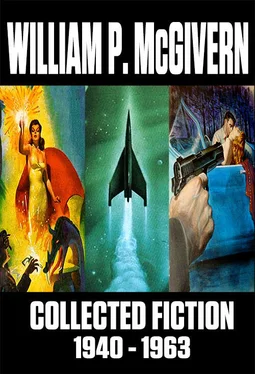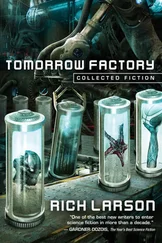Уильям Макгиверн - Collected Fiction - 1940-1963
Здесь есть возможность читать онлайн «Уильям Макгиверн - Collected Fiction - 1940-1963» весь текст электронной книги совершенно бесплатно (целиком полную версию без сокращений). В некоторых случаях можно слушать аудио, скачать через торрент в формате fb2 и присутствует краткое содержание. Год выпуска: 2014, Издательство: Jerry eBooks, Жанр: Ужасы и Мистика, Фантастика и фэнтези, Детектив, Прочие приключения, на английском языке. Описание произведения, (предисловие) а так же отзывы посетителей доступны на портале библиотеки ЛибКат.
- Название:Collected Fiction: 1940-1963
- Автор:
- Издательство:Jerry eBooks
- Жанр:
- Год:2014
- ISBN:нет данных
- Рейтинг книги:3 / 5. Голосов: 1
-
Избранное:Добавить в избранное
- Отзывы:
-
Ваша оценка:
- 60
- 1
- 2
- 3
- 4
- 5
Collected Fiction: 1940-1963: краткое содержание, описание и аннотация
Предлагаем к чтению аннотацию, описание, краткое содержание или предисловие (зависит от того, что написал сам автор книги «Collected Fiction: 1940-1963»). Если вы не нашли необходимую информацию о книге — напишите в комментариях, мы постараемся отыскать её.
Collected Fiction: 1940-1963 — читать онлайн бесплатно полную книгу (весь текст) целиком
Ниже представлен текст книги, разбитый по страницам. Система сохранения места последней прочитанной страницы, позволяет с удобством читать онлайн бесплатно книгу «Collected Fiction: 1940-1963», без необходимости каждый раз заново искать на чём Вы остановились. Поставьте закладку, и сможете в любой момент перейти на страницу, на которой закончили чтение.
Интервал:
Закладка:
It was going to be wonderful. And when the money began to pour in, he and Ann could get married right away. That was the most wonderful thing of all.
When Oscar finally staggered into his small bedroom, he was dizzy with exhaustion. He set his burden down on the floor and sank into a chair. But not for long. There was work to be done.
He stood up and crossed over to a strange, complicated contraption that took up almost half the space in the room.
It was a box-like affair, sprinkled with rheostats and dials and wires leading from it to a storage battery in the corner of the room. The top of the box was grilled like an electric stove and on top of this, there stood a huge glass hopper, in which a strange dark-colored liquid bubbled noisily. Vapors and gases rose from the vial, clouding the room with a murky haze.
Oscar peered at the dials and inspected the bubbling liquid.
“ ’Bout ready,” he muttered. “No time to lose.”
Turning from the odd equipment, he picked up a jar of the vanishing cream and unscrewed the metal cap. Then with feverish haste he seized a knife and began digging the pasty cream from the jar, allowing the lumpy wads to fall splashing into the boiling liquid.
In fifteen minutes the room was littered with empty jars, and the sticky compound in the hopper had risen to a bubbling white mess that threatened to overflow onto the floor.
“Maybe I got too much,” Oscar thought. But no, he was down to the last bottle of cream and there was still an inch of room left in the vat.
“Good thing,” Oscar mumbled. “I’ve still got to put my special formula in.”
With trembling fingers he picked up a black bottle from a work bench next to the box-like mechanism. It was filled with an oily black fluid, and as Oscar removed the cork his heart hammered with pride. It was his own formula and it was wonderful. Or, he amended, it would be wonderful.
The gluey compound was frothing and seething as he tilted the black bottle and prepared to dump its contents into the vat. He knew suddenly how Franklin must have felt when he discovered electricity: a giddy sense of exhilaration and a throbbing pulse that sent the blood racing through his veins.
It was great, and with a smile on his lips Oscar closed his eyes and emptied his special formula into the bubbling cauldron.
The results were a thousand times more surprising than Oscar, in his nimblest flight of imagination, could have conceived.
A geyser of flame shot upward from the vat and the next instant, the floor trembled with the force of a mighty explosion. Oscar was hurled to the floor and before he could move again, a sticky suffocating blanket seemed to descend upon him.
Thrashing wildly, he beat at the cloying folds that draped about him and finally managed to struggle to his feet. He forced his eyes open, and a despairing moan broke from his lips at the sight that met his stricken gaze.
His machine was utterly demolished. Parts of it were strewn from one end of the room to the other, and Oscar himself was covered from head to foot with the sticky paste that had bubbled in the bowels of the vat.
“Oh,” he groaned, “something must have gone wrong.”
And a moment later — “What are you up to in there, Oscar Doolittle?”
The shrill voice sounded from the hallway. Oscar trembled in panic and guilt as he recognized it. His landlady!
“It’s nothing, Mrs. Spears,” he quavered in terror. “I just blew a fuse. A big fuse.”
“Fuse, nothing,” Mrs. Spears screamed, “I’m coming in there!”
The words were slightly unnecessary, for by the time they had stopped echoing Mrs. Spears was standing in the middle of the room.
“Oh,” she shrieked as her horrified gaze encountered Oscar’s bespattered figure, “what have you been up to?”
“It was my invention—” Oscar began.
But Mrs. Spears’ howl of anguish cut him off.
“Inventing again! This is the last straw. I’ve warned you before but this time I’m through. Out you go! Pack your duds and clear out of here.”
She paused to stare wildly about the wreckage of the room.
“And remember,” she snapped, “you don’t get your trunk until this mess has been paid for.”
With a final withering look at Oscar’s paste-daubed figure, she marched stiffly from the room, banging the door behind her.
The slam of the door seemed to Oscar to symbolize somehow the crash of his own hopes and dreams. He slumped into a chair and stared moodily at the strewn remains of his machine. From his sorrowful eyes two large tears welled, trickled down the pasty substance that caked his cheeks, to fall with a tiny splash to the floor.
Finally he stood up wearily. Disappointments or no, he couldn’t be late for work.
Chapter II
Oscar’s Bad Day
Forty-five minutes later, disillusioned and disconsolate, Oscar Doolittle trudged through the portals of the Midland State Bank. Even the sight of Ann, hurrying to meet him, did not revive his spirits.
“I’ve got some bad news for you,” he said, when she stood in front of him. “My invention is a flop. I guess what everybody has been saying about me is true. I’m a failure, a washout.”
If Oscar was expecting sympathy and encouragement he received a rude shock. Although he might have been prepared for it, because of late Ann had been acting anything but the role of a starry-eyed bride-to-be.
Ann Meade was a cuddly, shapely blonde, but the words that snapped from her now seemed very much out of place with her sugary appearance.
“If that’s what people are saying,” she blazed, “they’re absolutely right!” You’re nothing but a spineless, weak-kneed jellyfish, Oscar Doolittle! A timid, helpless doormat that other men wipe their feet on. I must have been out of my mind when I accepted your ring, but thank goodness I’m sane now! Here!”
Oscar Doolittle listened dazedly to this unflattering summary of his negative virtues, and then his incredulous eyes focused on the modest diamond ring that was thrust under his nose.
“But darling,” he bleated hoarsely, “you can’t do this to me! We’ve been engaged for five years, we’ve worked together here at the bank. What will Mother say?”
Ann Meade’s neat little mouth looked like a steam-rollered rosebud.
“To be blunt about it,” she said icily, “I don’t give a darn what your mother says. Let’s call our engagement a case of mistaken identity. I thought you were a man — and what a mistake that turned out to be! If you were a man — a man like that handsome Lester Mercer, now — you’d realize that no woman can love a man she doesn’t respect.”
With this withering blast as an exit line, Ann dropped the ring into Oscar’s trembling fingers and marched away, her heels clattering angrily on the marble floor.
Oscar stared after her trim, rounded figure as it swished through the long corridor of the Midland State Bank and finally disappeared with a flash of silken legs around the corner of the incoming-cash department.
As the realization of his loss flooded over him, a lump the size of an ostrich egg crawled up his scrawny neck, almost choking him. It was with an effort that he managed to get himself under control. He blinked rapidly and squared his thin shoulders resolutely.
“I’ll show her,” he said. “I’ll show her, and then she’ll be sorry. “I’ll—”
“What’s that you’re mumbling?”
The words cracked like a pistol shot next to Oscar’s ear, dissolving his incipient daydream, jerking him about to face the horrible reality of Lester Mercer, chief efficiency expert of the Midland State Bank and chief fly in Oscar’s ointment.
Читать дальшеИнтервал:
Закладка:
Похожие книги на «Collected Fiction: 1940-1963»
Представляем Вашему вниманию похожие книги на «Collected Fiction: 1940-1963» списком для выбора. Мы отобрали схожую по названию и смыслу литературу в надежде предоставить читателям больше вариантов отыскать новые, интересные, ещё непрочитанные произведения.
Обсуждение, отзывы о книге «Collected Fiction: 1940-1963» и просто собственные мнения читателей. Оставьте ваши комментарии, напишите, что Вы думаете о произведении, его смысле или главных героях. Укажите что конкретно понравилось, а что нет, и почему Вы так считаете.

![Уильям Макгиверн - Завтра опять неизвестность [английский и русский параллельные тексты]](/books/35168/uilyam-makgivern-zavtra-opyat-neizvestnost-angli-thumb.webp)









